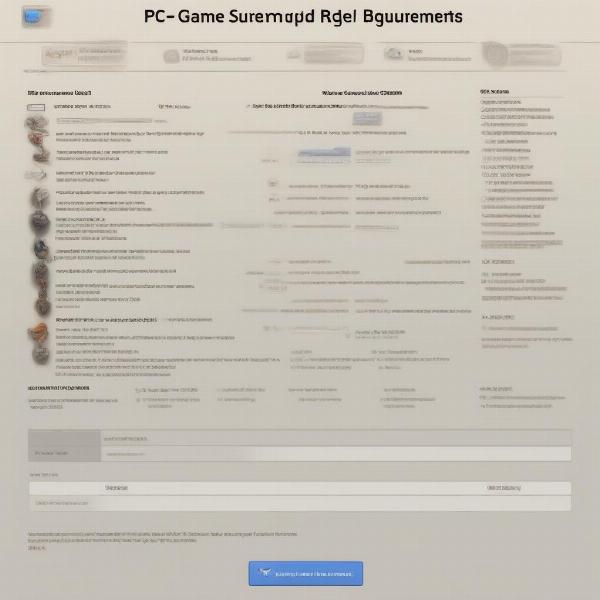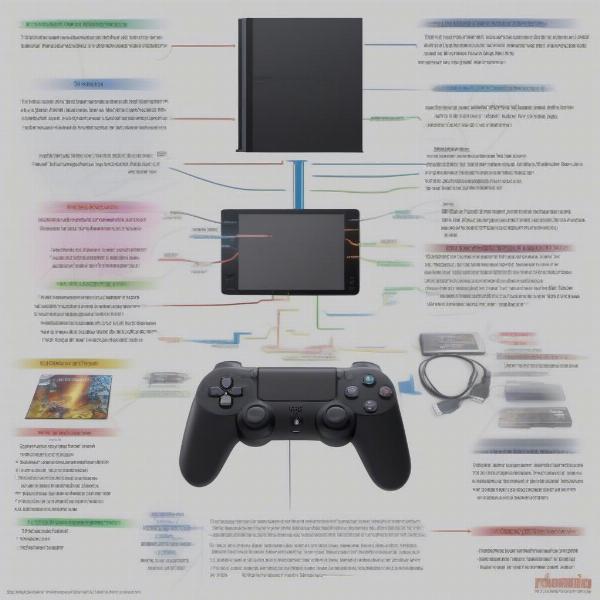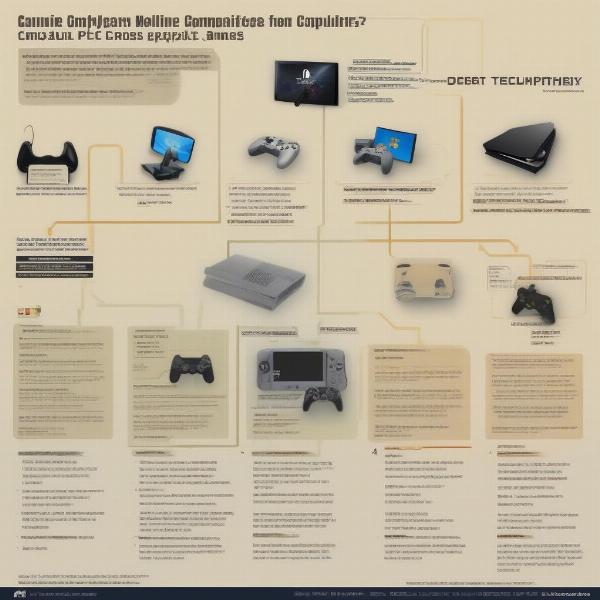So, you’re wondering “Can I Play The Game?” It’s a question as old as gaming itself, and one with many answers depending on the specific game, your hardware, and sometimes even your region. This comprehensive guide will walk you through everything you need to know to ensure your gaming experience is smooth and frustration-free. We’ll cover various platforms, common compatibility issues, and some handy tips to troubleshoot those tricky moments.
Let’s dive in! First, we need to understand that “can I play the game” encompasses a vast range of scenarios. Are you asking about a specific game on a particular console? A PC game’s minimum requirements? Maybe it’s about online multiplayer compatibility? Each situation requires a unique approach.
Understanding Game Compatibility: Hardware and Software
The ability to play a game hinges on two key factors: hardware and software. Your hardware is the physical equipment – your console (PlayStation, Xbox, Nintendo Switch), PC, or even your mobile device. The software is the game itself, along with its necessary drivers and updates.
-
Hardware Considerations: This includes your processor, graphics card (GPU), RAM, storage space, and even your operating system (OS). Many games will specify minimum and recommended requirements. Failing to meet the minimum requirements often leads to poor performance, lag, or even an inability to launch the game. Falling short of the recommended specs might mean you need to adjust the graphics settings to a lower level.
-
Software Considerations: This goes beyond just owning the game. You need the correct version of the game, any necessary updates, and sometimes specific software drivers or applications. For example, some PC games require specific versions of DirectX or other APIs to function correctly.
“Can I play this game on my old PC?” is a common question. If you’re considering running older games on a less powerful machine, you might need to research compatibility guides specifically for that title and system. Many retro games can still be played on newer PCs with emulation software, offering a way to experience classics.
Checking Game Requirements: A Step-by-Step Guide
Before you even think about purchasing a game, always check its system requirements! This is crucial, especially for PC games. Here’s how to do it properly:
-
Find the Game’s Store Page: Locate the game on the platform where you intend to buy it (Steam, Epic Games Store, PlayStation Store, etc.).
-
Look for “System Requirements” or “Specs”: This information is usually listed prominently on the game’s page, often in a tab or section dedicated to specifications.
-
Compare Your Hardware: Check your computer’s or console’s specifications against the listed requirements. Pay close attention to the minimum and recommended requirements. Aim for meeting the recommended specifications for the best experience.
-
Consider Game Updates: Keep in mind that the system requirements might change with game updates. Always check the latest information before buying.
For console games, the process is simpler. The back of the game case will typically list the console(s) it’s compatible with. However, checking for updates is still important, as some updates might introduce compatibility issues or require specific firmware versions on your console. Similar to older games on PCs, emulators can offer a pathway for playing games outside of their original systems. For example, you might find yourself asking: “Can I play Nintendo 64 games on my modern computer?” and emulation can provide an answer, however there are copyright considerations you must understand.
Common Compatibility Issues and Troubleshooting
Even when you meet the requirements, sometimes you might encounter unexpected issues. Here are a few common problems and how to troubleshoot them:
-
Game Crashes: This could be due to various issues, ranging from insufficient hardware to software conflicts or corrupted game files. Try verifying the game files’ integrity (if applicable), updating your drivers, or reducing the game’s graphics settings. Consider the possibility of a bug within the game itself and check for patches or updates from the developer.
-
Lag and Poor Performance: If the game runs slowly or intermittently freezes, your hardware might be underperforming. Try lowering the graphics settings, closing other applications, or upgrading your hardware components. Internet speed also greatly impacts online multiplayer games. A weak connection will show itself in increased latency and game unresponsiveness.
-
Game Won’t Launch: Ensure you’ve installed the game correctly, have the necessary prerequisites (such as DirectX), and have sufficient disk space. Also check if the game requires administrator privileges to run.
-
Online Multiplayer Issues: These often stem from server problems or network connectivity issues on your end. Check if the game’s servers are down, restart your router, and test your internet connection speed. You may also want to make sure that any required network services such as NAT type have been configured correctly.
-
Compatibility Problems Between Consoles and Generations: Remember, you cannot generally play games from earlier generations on newer consoles. For example, as stated in our article can my ps5 play ps3 games, backward compatibility isn’t always guaranteed.
Can I Play the Game on Different Platforms? A Cross-Platform Perspective
Many modern games boast cross-platform play, allowing you to connect with friends on different consoles or PCs. However, this isn’t always the case. Before diving into a multiplayer game, always check if it supports cross-platform play with your preferred platform and your friends’. The reality is that the simple question “Can I play this game with my friend?” could have a multifaceted answer, dependent on several factors.
Similar to console generations, you might wonder about the possibilities of playing across various Nintendo devices. Our article on can a wii play wii u games delves into that specific concern.
Beyond the Basics: Regional Differences and Game Editions
Sometimes, “can I play the game” also comes down to regional restrictions. Certain game versions might only be playable in specific regions due to licensing agreements or censorship policies. Always check the game’s description or product information for regional restrictions to avoid disappointment. Additionally, different editions of a game might have different compatibility issues; special editions or collector’s items can sometimes have unique requirements.
 checking-pc-game-requirements
checking-pc-game-requirements
Dr. Anya Sharma, a renowned game developer and professor of game design at the University of California, Berkeley, notes: “Understanding the underlying technical aspects of game compatibility is crucial for both developers and players. It’s about understanding the interplay between hardware, software, and the game’s engine.”
Embracing the World of Emulation: Playing Older Games
If you’re keen on playing older games, the world of emulation offers exciting possibilities. Emulators allow you to run games from past consoles or systems on modern PCs. However, it’s crucial to remember that using ROMs without proper licensing can be illegal in many jurisdictions. Remember to check your regional laws and regulations.
A question you might find yourself asking is “Can I play PlayStation 2 games on my PC?” The answer lies in the availability of PS2 emulators and the legal acquisition of the game itself.
 retro-gaming-emulation
retro-gaming-emulation
“The rise of emulation has significantly broadened access to classic games,” says Mr. Kenji Tanaka, a veteran game collector and enthusiast. “However, responsible use and awareness of copyright laws are paramount.”
Exploring Different Game Genres: Compatibility Matters Across the Board
Compatibility considerations extend across various game genres. For instance, if you enjoy card games, you might find yourself asking what card games can you play by yourself. The answer, of course, depends on the game itself and its design. For some, even mobile devices are enough, while others will only run on a PC.
 online-multiplayer-compatibility-chart
online-multiplayer-compatibility-chart
Conclusion: Mastering Game Compatibility for a Seamless Experience
Figuring out “can I play the game” often involves a blend of research, patience, and a little troubleshooting. By carefully checking system requirements, understanding potential compatibility issues, and exploring resources like emulation (legally, of course!), you can significantly enhance your gaming experience and access a wider range of titles. So go forth and game on!
FAQ
Q1: What happens if I don’t meet the minimum system requirements of a game?
A1: The game might not run at all, or it might run poorly with significant lag, low frame rates, and graphical glitches.
Q2: Can I upgrade my hardware to improve compatibility?
A2: Yes! Upgrading your PC’s RAM, graphics card, or processor can greatly improve your ability to run more demanding games.
Q3: How can I tell if my game is compatible with online multiplayer?
A3: Check the game’s official website or store page; it will usually specify whether cross-platform play is supported and will list any required online services.
Q4: What are ROMs and emulators?
A4: ROMs are digital copies of game cartridges or disks, and emulators are programs that allow you to run these ROMs on modern hardware. However, using ROMs without proper licensing is often illegal.
Q5: Are there any legal ways to play older games on modern hardware?
A5: Yes, many older games are available on modern digital stores (like Steam or GOG), and some modern consoles offer backward compatibility with previous generations.
Q6: What should I do if my game keeps crashing?
A6: Try verifying the game files, updating your drivers, lowering graphics settings, checking for system errors, and searching for known bugs or fixes online.
Q7: Why is cross-platform play sometimes unavailable?
A7: Several factors contribute, including technological limitations, licensing agreements, and developer choices.

